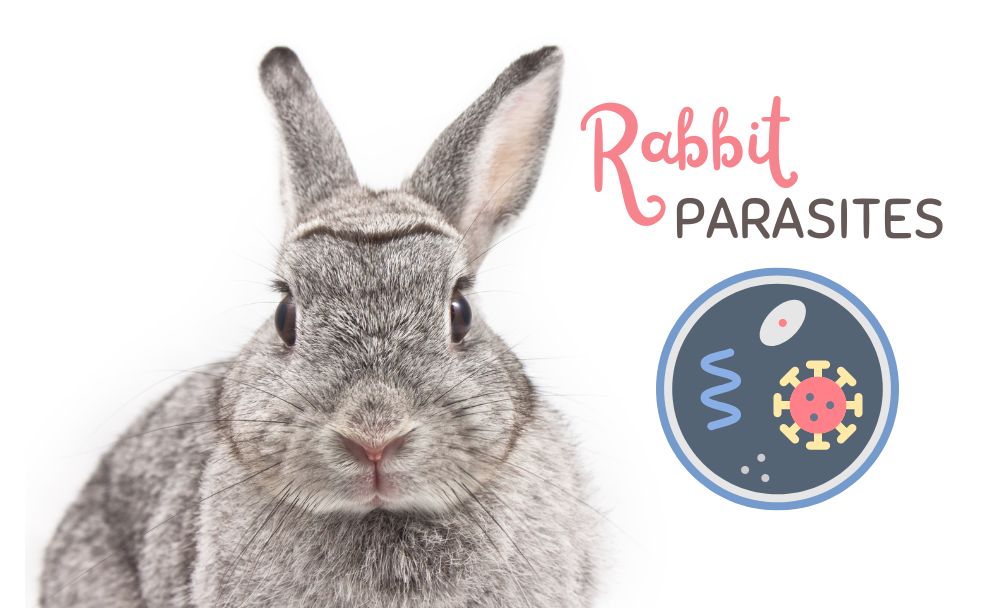Cute, cuddly, and oh-so-clean—rabbits are the perfect pet. At least, that’s what you may believe about your pet bun. However, a host of small and microscopic parasites can lurk beneath all that fluffy cuteness. You need to be aware of rabbit parasites to ensure your rabbit lives a pain-free and peaceful life.
Monitoring your pet rabbit for parasites will help with early treatment, prevent the spread of parasites to other rabbits and pets (and to you), and help diagnose how your rabbit got infected (to prevent reinfection).
Common Rabbit Parasites
There are several common rabbit parasites your bunny can contract, carry, and spread. The most common rabbit parasites are:
- Coccidiosis (hepatic and intestinal)
- Intestinal worms like tapeworms and pinworms
- E. cuniculi (brain and kidney parasite)
- Ectoparasites like mites, fleas, flies, and ticks
- Fungal infections like encephalitozoonosis (affecting the skin)
Parasites in Rabbit Poop
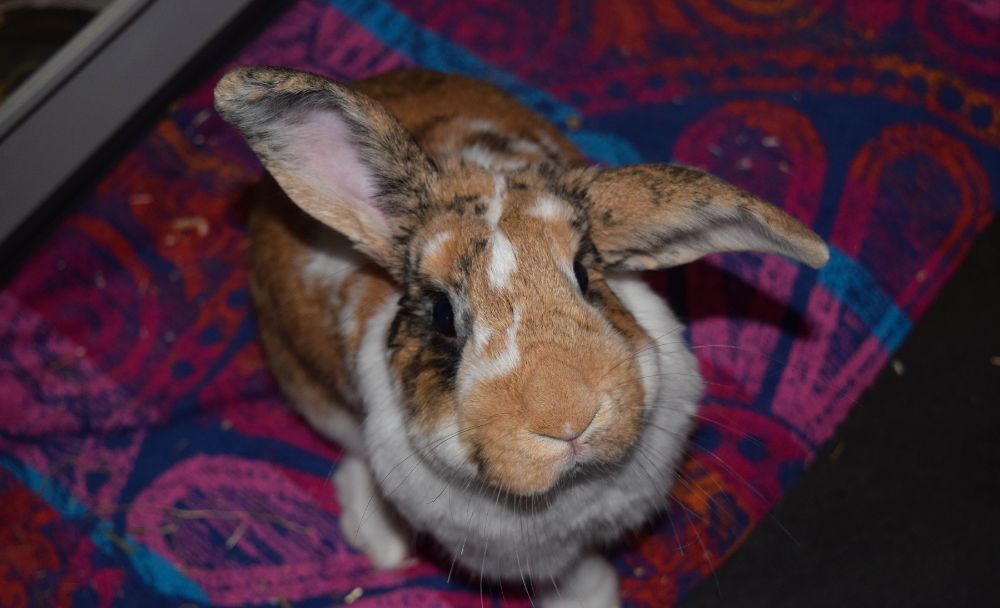
Rabbit poop contains parasites like pinworms, roundworms, and tapeworms. Your bun’s poop isn’t known to spread other parasites to non-rabbits. If another animal, like a dog, is old or immunocompromised, they may contract worms from eating rabbit poop. Usually, this is a transitory infection, as rabbit worms are species-specific.
What is a cause for concern is the spread of certain worm species to children who play with infected rabbit fecal matter. These worms can lead to the child contracting worms, which may migrate to other areas of the tissue, not just the child’s intestines. Worms may begin to infect the ocular tissues, causing blindness.
Rabbit droppings are, however, known to spread the protozoa from the Eimeria species, which causes coccidiosis. While you can’t contract coccidiosis from your rabbit, your other pets may be intermediary hosts, which can damage their livers.
When rabbits have contracted contagious diseases or parasites, it is often the rabbit’s proximity to their hutch that causes their droppings to become carriers or vectors for infection. The rabbit poop makes contact with the rabbit’s bedding, the bottom of the cage or hutch, and their fur, which is how the poop then carries parasites like mites, bacteria, and fungal spores.
Keep your rabbit’s hutch clean. Regularly clearing out and scrubbing their cages is a good way to minimize contagions and disease spread.
As a rule, don’t handle rabbit droppings with your bare hands, and if you must, wash your hands thoroughly after with soap and warm water to destroy any bacterial contamination or worm eggs that may have been on the rabbit poop.
Rabbit Intestinal Parasites
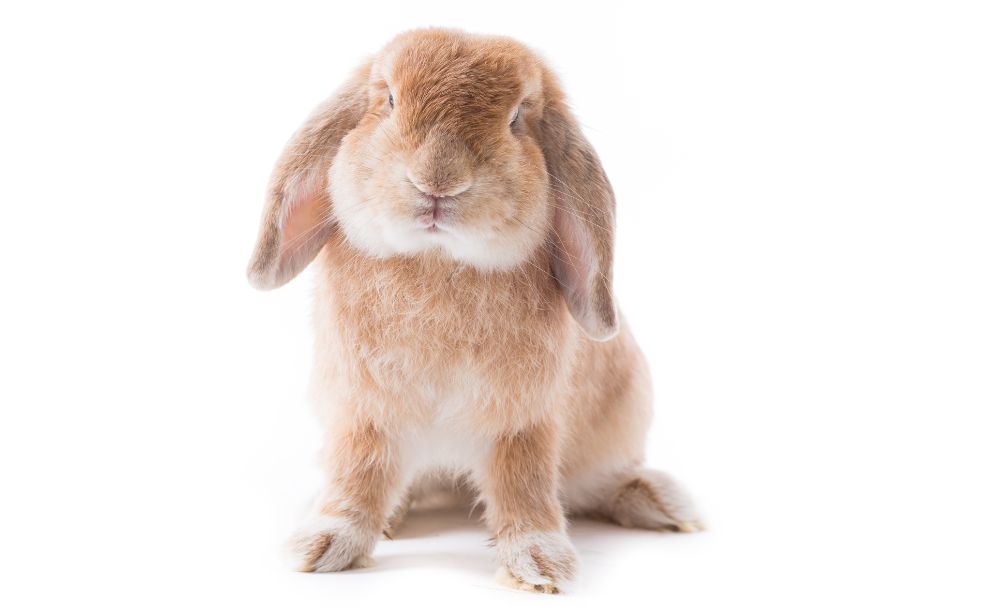
Intestinal parasites in rabbits can be much more worrisome. These internal parasites are usually microscopic, and the impact on your rabbit’s health may be easily missed at first.
Coccidiosis
Intestinal parasites that affect rabbits include coccidiosis, which rabbits get from eating food containing the oocysts that spread the Eimeria protozoa. These oocysts are also found in rabbit droppings, and if your rabbit urinates or poops in their food sources, they may ingest the protozoa and develop one of two types of coccidiosis.
The first type is hepatic coccidiosis, which is treated by administering Sulfaquinoxaline according to your vet’s prescription. The treatment is long-term, and in worst cases, your rabbit may develop lesions on their liver, which can affect their quality of life.
The second type of coccidiosis is intestinal, and this type is usually mild, with a seven-day treatment protocol with Sulfaquinoxaline. The medication is repeated for another seven days a week later.
Encephalitozoon cuniculi
Yet another internal and external parasite is a fungal infection caused by E. cuniculi spores, which eventually affects rabbits’ kidneys and nervous system. While more than half of the rabbits who test positive for antibodies to the infection show resistance to the parasites, there are still many rabbits who do become seriously ill.
A test of your rabbit’s urine will reveal traces of antibodies against the protozoa spores, indicating an immune response that confirms a diagnosis. The parasites also spread through contaminated urine and aerosolized urine droplets produced when rabbits spray or mark their territory.
Rabbits ingest the spores of the fungus, and the spores travel along the intestinal tract to set up shop in the kidneys, nervous system, and lenses of the eyes.
Essentially, E. cuniculi is a type of rabbit meningitis affecting the rabbit’s coordination, eyesight, and movement.
Intestinal Worms
Rabbits can carry different worms, from pinworms and tapeworms to roundworms and wolf worms. The larvae of these worms easily migrate throughout the rabbit’s system, burrowing through the rabbit’s liver or into their skin, causing painful cysts. Eggs are then excreted in the rabbit’s droppings, or you may even find worm eggs and larvae on the rabbit’s fur from their saliva.
Physical contact can spread these larvae to soft tissue such as eyelids, mouth, and nasal passages. From there, these larvae can travel throughout the human body, causing potentially horrific damage such as blindness, respiratory issues, and intestinal damage.
While humans and even dogs or cats aren’t the natural hosts to these rabbit-born worms, we may be a temporary host to these worms and their larvae. Pinworms, tapeworms, and roundworms may quickly turn your body into a pitstop while they search for a better host.
Rabbit Skin Parasites
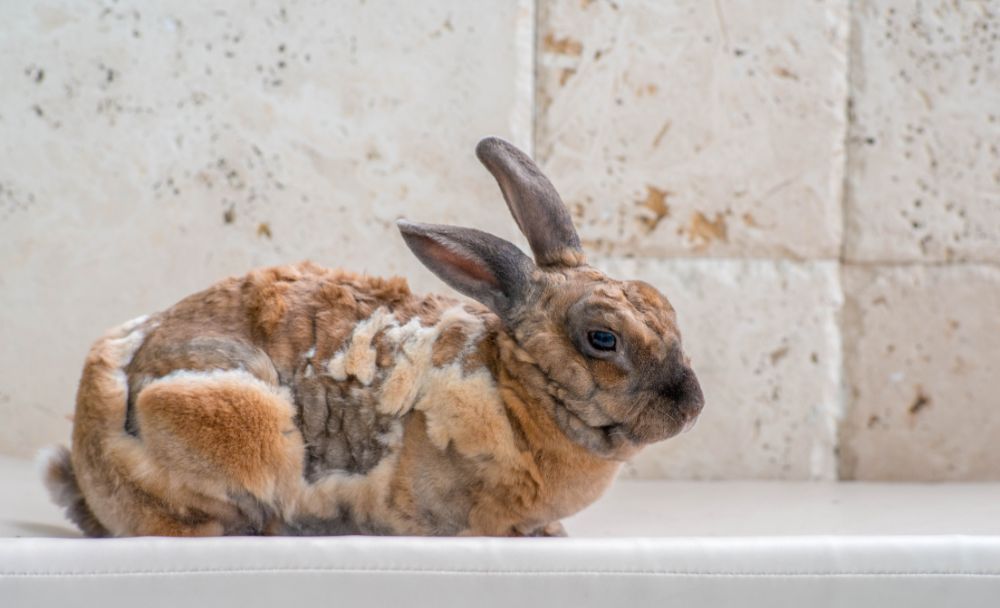
Rabbits can contract skin parasites like fungal infections and parasitic creatures that feed on the rabbit as a blood meal or eat the keratin in the rabbit’s skin cells. Creatures like lice, ticks, mosquitos, mites, and fleas all feast on the rabbit’s skin by either sucking blood or eating the protein or keratin in the skin.
Fur mites can be seen as “walking dandruff” on the rabbit’s coat, and the resulting itching of these parasitic creatures can lead to fur loss, excessive scratching, and self-mutilation as they greatly annoy the rabbit. Bald patches are a dead giveaway of body mites and ear mites.
Parting the rabbit’s fur may also reveal ticks, fleas, and other skin parasites. These parasites can lead to exsanguination (blood loss) and severe dermatitis (hair loss and skin infections or rashes). Since rabbits have very sharp claws on their hind legs, a rabbit that scratches constantly is sure to cause severe injury and possibly skin infections from scrapes.
Fungal infections caused by spores rooting in the rabbit’s skin can also result in serious harm.
Rabbit Ear Parasites
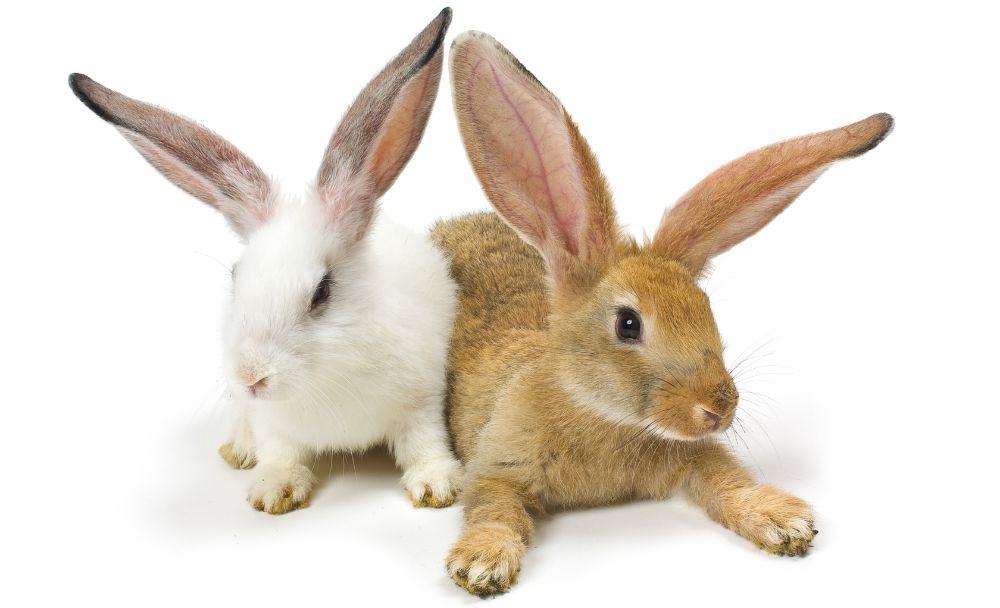
The rabbit ear pinnae are sensitive to parasites like ear mites that feast on the keratin in the rabbit’s ears. The bites ooze serum, forming a rough layer over the rabbit’s skin and causing open, bleeding wounds. This dried exude shouldn’t be removed without first sedating the rabbit as it’s extremely painful and can cause shock if removed while the rabbit is awake.
The irritation of the itching that results from the mite bites and dry exude that scrapes on the skin cause a rabbit to scratch endlessly, inflicting self-harm with their sharp claws. Wounds can result in a secondary skin infection.
How Does a Bunny Get a Parasite?
Even the best cared-for bunny can pick up a parasite or ten. Infestation happens with the slightest chance that your rabbit has contact with contaminated surfaces, another rabbit, or pet. When someone holds your rabbit after touching another parasite-infected pet, the parasites can migrate to your bun.
Most often, rabbits will contract a parasite if they live in an unclean environment, where droppings are polluting their food or water source. Some rabbits may have contact with other pet rabbits or wild rabbits with a parasite burden. Even contact with other pet animals like dogs, cats, or ferrets can spread parasites.
Trips to the vet where other animals have recently been that are ill or have a parasite burden can also lead to contamination with a parasite for your rabbit, which is why covering your rabbit in a towel when waiting in the reception area is a good idea.
Most parasites simply hop over, burrow into the rabbit’s skin, or breed inside your pet rabbit once ingested from contaminated food or water sources.
Could My Indoor Rabbit Have Parasites?
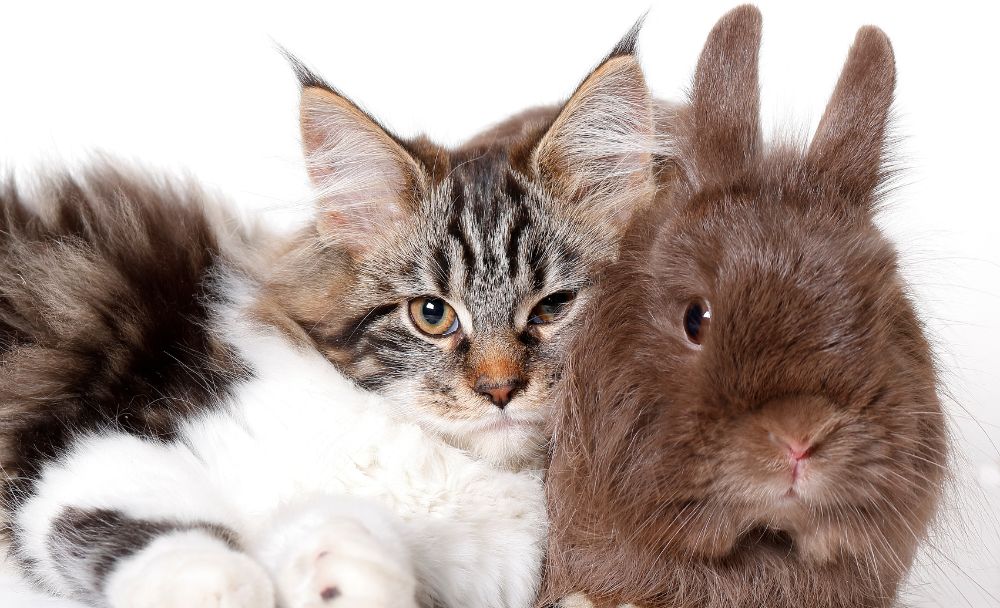
Your indoor rabbit can have parasites. If you think your rabbit is safe since you keep them indoors, guess again. Indoor rabbits are also at risk of contracting parasites, especially if they have contact with other pets like cats and dogs.
Vet visits, trips in the car (with the window down), and even contaminated food can spread parasites to your bunny. Even a trip to the groomers can lead to a severe parasite infestation.
Rabbits raised for meat in enclosed sheds may also contract parasites if they are kept in large herds in small areas where the risk of transmission can be high. Regular inspection of the rabbits would help monitor the herd’s health and prevent unnecessary culling due to contamination.
Signs a Rabbit Has Parasites
What are the signs that a rabbit has parasites? Depending on the type of parasite your rabbit has, you may see any of the following signs:
- Head shaking
- Scratching
- Lack of appetite
- Runny diarrhea
- Constipation
- Loss of fur or bald patches
- Excessive licking
- Exude oozing from small bites (usually in the ears and around the jaw area)
- Skin lesions
- Difficulty walking
- Carrying head to one side
- Sudden weight loss
- Loss of vision
- Being extra flighty
Wild Rabbit Parasites
Domestic rabbits, when kept in good hygienic living environments, are relatively parasite free. However, wild rabbits are prone to parasites like worms, mites, and intestinal parasites caused by protozoa.
Wild rabbits may be attracted to domesticated rabbits and try to enter the garden or area around the outdoor hutch if there is an abundance of food available. Unfortunately, this can also mean that fleas from wild rabbits can cross to your domesticated or pet rabbits.
Should the wild rabbits spray against the side of your hutch or in your garden, this also increases the risk of the oocysts from the Eimeria protozoa being inhaled or ingested by your pet rabbits. With the cross-transmission of these protozoa, domestic rabbits can contract coccidiosis and other intestinal parasites like worms.
For hunters, the rabbits being hunted and slaughtered may also spread harmful diseases and parasites to humans, such as when a hunter handles contaminated rabbit meat that results in tularemia and other fatal diseases.
How to Treat Rabbit Parasites
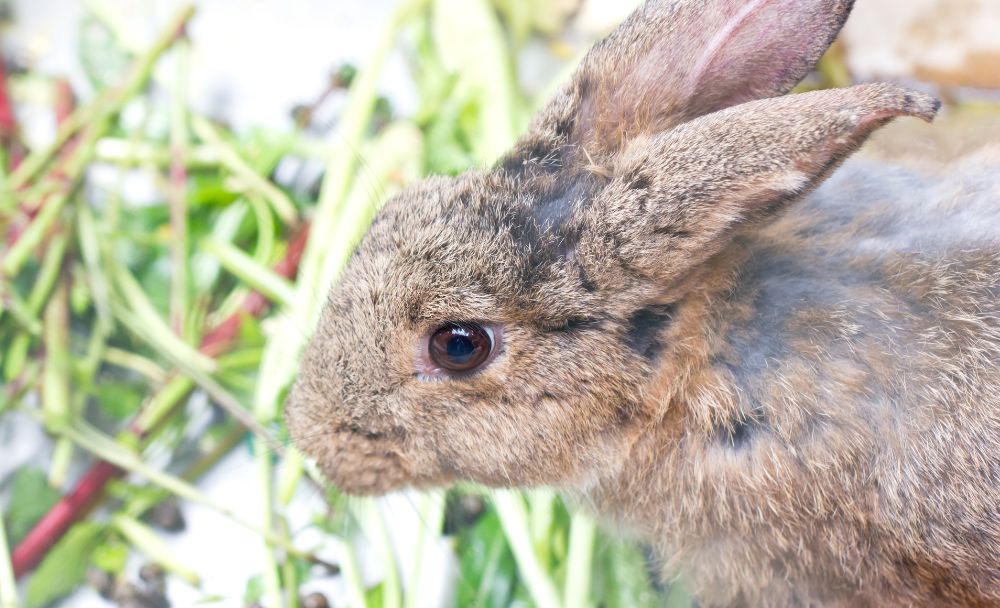
Prevention is better than cure, so preventing your pet rabbits from getting parasites is far better than managing the results of parasitic organisms.
- Parasites thrive in filth, so ensure your rabbit hutches are clean and rinsed regularly with bleach mixed with hot water at a ratio of 1:10. If a rabbit is identified as having parasites, isolate that rabbit from the other rabbits or family pets. Next, remove all bedding, scrub the cage, and replace with fresh bedding to prevent further spreading of parasites. The entire cage should be sanitized, so remove and wash EVERYTHING, and replace all porous materials.
- Regular grooming routines can help prevent skin parasites, but it can also give you early warning if you detect parasitic insects like fleas and mites while grooming your bunny. When you see there’s a problem early, the health effects are much less severe and much easier to treat.
- Spotting ear mites can help you treat the problem with a short course of ivermectin or a herbal oil that can help dislodge the parasites before your rabbit starts oozing serum and developing painful scabs in their ears.
- Keep an eye out for the signs of parasitic activity such as scratching, hanging ears (unless your bun is a mini lop), and flaking skin or open sores.
- Regularly deworming your rabbit with a rabbit-safe de-wormer helps you manage any intestinal parasites.
- If you suspect your rabbit may have worms, you can have a fecal count done to establish how high the level of infestation is. By examining the rabbit poop, the vet can identify the type of intestinal parasite and prescribe an appropriate treatment.
- When treating rabbits for parasites, other pets in the house must also be treated. Worms, mites, and fleas may jump from rabbits to dogs or cats. While these animals aren’t their preferred host, the parasites can infect alternative hosts from there.
- For internal rabbit parasites such as E.cuniculi, administering corticosteroids to help prevent inflammation helps prevent further symptoms and destroy the protozoa.
Keeping Your Bunny Parasite Free
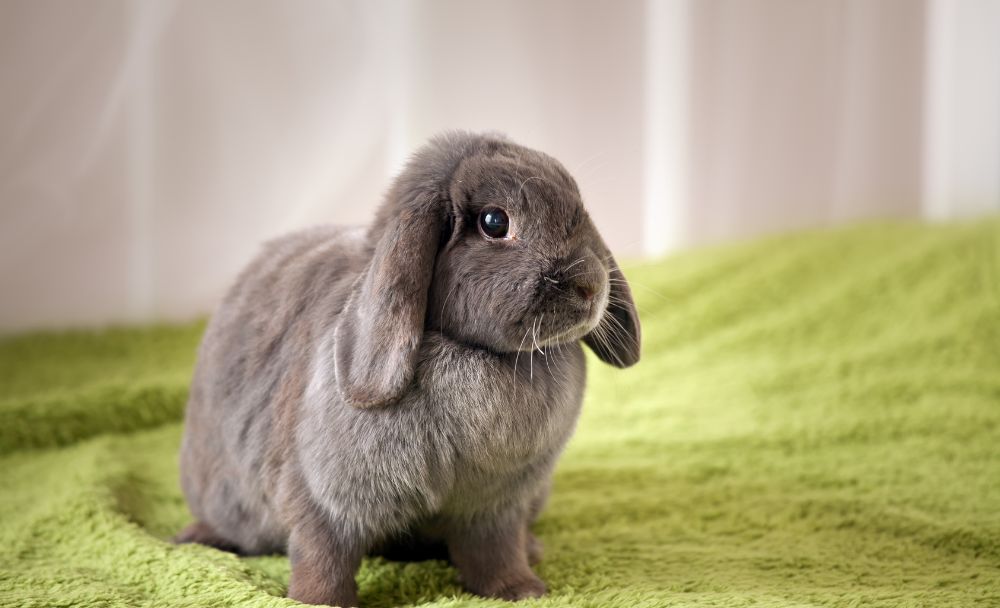
For rabbit owners, the key to a healthy, happy, and safe rabbit is to keep them and their environment clean. Avoid contact with other animal species that aren’t yours, as you can check that your dog has had their vaccinations or your cat is flea-free, but you have no control over stray animals.
Check your rabbit regularly for signs of parasites by grooming and playing with them, noticing any sudden changes in your rabbit’s attitude, body, and energy levels. If your rabbit suddenly loses weight, becomes lethargic, or scratches moodily, chances are they have a parasite problem.
The best option is to have your vet give your rabbit a complete checkup and prescribe appropriate treatment.

